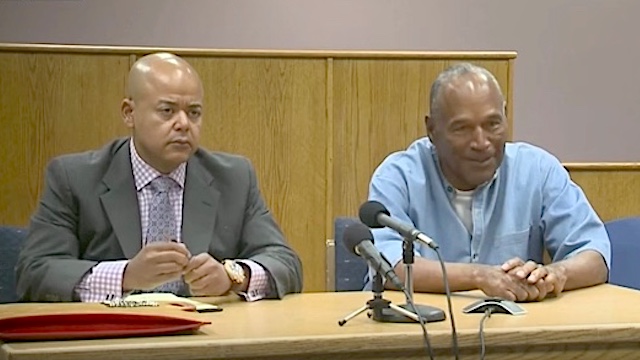
LaVergne has also made several attempts to start a twitter feud with Law & Crime founder Dan Abrams, in retaliation for Abrams’ having called LaVergne out for his wildly inappropriate tweets.
Yesterday’s volley:
Americans may not be of one mind when it comes to O.J. Simpson, but I think we can all agree that cyber-antagonizing the Goldmans is nothing short of grotesque. There just aren’t a lot of things worse than haranguing the family members of a young man who was brutally slain, especially when you represent the man who was (civilly, of course) found responsible. There is the possibility that LaVergne’s conduct constitutes a violation of Nevada’s ethical rules. After all, lawyer-jokes aside, attorneys are expected — indeed required — to comply with standards of professional responsibility.
The Nevada Rules of Professional Conduct provide the following:
“Rule 4.4 Respect for the Rights of Third PersonsIn representing a client, a lawyer shall not use means that have no substantial purpose other than to embarrass, delay, or burden a third person…”
I suppose LaVergne’s “substantial purpose” for trolling family members of murder victims would be zealous advocacy of his client, or perhaps gaining a little publicity for himself. While I’m not quite sure that’s what the Nevada Bar had in mind, it could be an adequate defense to a charge or professional misconduct.
There’s also a rule prohibiting what can be said in attorney advertisements. While only some Twitter posts strictly count as “advertising,” the sentiment is pretty clear:
“There shall be no dramatizations, testimonials or endorsements in any advertisement in any medium. A lawyer’s advertisement, regardless of medium, must provide only useful, factual information presented in a nonsensational manner…”
I’m pretty sure posting that “Wacky Kim” is invited “to send more cards and love letters” to the man found liable for causing the death of her brother does not constitute communication in a “nonsensational manner,” but the advertising rules are more often used to regulate things like over-the-top testimonials and self-declared “experts.”
The State of Nevada has adopted the American Bar Association(ABA) rules of professional responsibility in total, and the ABA has issued some guidance for interpretation as follows:
“When attorneys are belligerent, aggressive or offensive, they misunderstand the true meaning of zeal and how to act with it….a lawyer should use the law’s procedures only for legitimate purposes and not to harass or intimidate others.”
Strictly speaking, it’s probably a bad idea to lash out at the family of someone your client has been found to have been civilly liable for — but then again, maybe there’s a “legitimate purpose” lurking out there somewhere.
Anyone who practices close to the world of criminal law sees a ton of crazy; still, a lawyer antagonizing victims who have already established civil liability against his client is some next-level insanity. Lawyers deal in “fault,” and in the matter of the death of Ron Goldman, the court has spoken: the fault falls squarely on O.J. Simpson’s broad shoulders. While Simpson’s counsel may not have clearly violated any rule, I don’t think I’m alone in finding that a lawyer who disparages a litigant for attempting to execute on the judgment that’s rightfully theirs has seriously stretched the bounds of professionalism; a person who has done so in an intentional death case leaves “professional“ in the dust. While I get the need to deflect, there’s just no room here for throwing other blame of any kind — not toward Dan Abrams, and certainly not toward Kim or Fred Goldman.
Judging from the rest of LaVergne’s Twitter feed, when he’s not on the attack, he’s attempting to ingratiate himself to those who might be impressed by his apparent proximity to O.J. Simpson:
I think we can file this one under “Bad Judgment At Every Turn.”